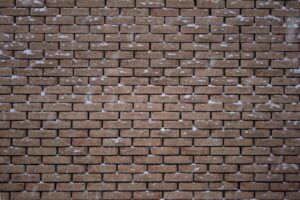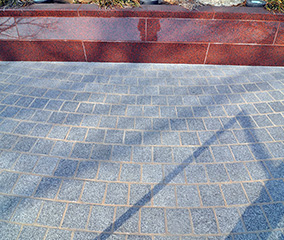
Learn how snow might damage your brick building and what to do about it.
Brick buildings are known for their durability and timeless charm, but winter weather can still pose risks. Snow, de-icing salts, and melting water can take a toll on your structure if not properly managed with the guidance of professional masons. Here’s how these winter elements can impact your brick building and what you can do to protect it with the help of DelPrete Masonry.
How Snow Can Damage Brick
Snow accumulation may seem harmless, but as snow sits on your brick surfaces, it holds moisture against the structure. Over time, this moisture can seep into the tiny pores of the bricks. When temperatures drop and the water freezes, it expands, leading to cracking, spalling (brick flaking), or structural weakening.
What to Do:
- Keep snow from piling up against the walls and foundations of your building.
- Inspect and repair any cracks or damage before winter to prevent water infiltration.
The Impact of De-Icing Salt
De-icing salts are often used to prevent slippery surfaces around your property, but they can be harmful to bricks. Salt can draw water into the bricks, accelerating the freeze-thaw cycle and causing spalling or discoloration. Over time, salt exposure can weaken both bricks and mortar, reducing your building’s structural integrity.
What to Do:
- Use de-icing alternatives like sand or non-corrosive ice melters that are safer for masonry.
- Rinse off salt deposits from bricks with clean water to minimize damage.
Problems Caused by Melting Snow
When snow melts, the water can pool around the base of your brick building or seep into cracks and joints. Excess moisture can lead to efflorescence (white salt deposits), mold growth, or weakened mortar joints. Prolonged exposure to water also increases the risk of foundational damage, especially during freeze-thaw cycles.
What to Do:
- Ensure your property has proper drainage to direct water away from the building.
- Inspect your building for any signs of water infiltration or efflorescence and address them immediately.
Steps to Protect Your Brick Building
Inspect and Maintain Your Masonry
Regular inspections can identify early signs of damage, such as cracks, spalling, or loose mortar. Address these issues with tuckpointing or masonry repair to prevent further harm.
Seal Your Bricks
Applying a breathable, waterproof sealant to your masonry creates a protective barrier against moisture while allowing the bricks to “breathe” and release trapped water vapor.
Clear Gutters and Downspouts
Properly functioning gutters and downspouts prevent water from pooling around your building, reducing the risk of foundation and masonry damage.
Consult a Masonry Expert
If your brick building has experienced significant snow or water damage, consult a masonry professional. They can assess the damage and recommend effective repair and prevention strategies.
Protect Your Building This Winter
Snow, de-icing salt, and melting water can challenge even the sturdiest brick buildings. However, proactive maintenance and timely repairs can protect your property from winter’s harsh effects. Contact DelPrete Masonry for expert advice and services to keep your brick building in excellent condition all year long.
CONTACT DEL PRETE MASONRY TODAY!
Whether you are ready to start your next masonry project or are still hesitant and have questions, Del Prete Masonry is here to help. We have the experience and expertise to get it right the first time. Questions? Want to visit some of our residential or commercial projects? Ready to set up a consultation? Feel free to give us a call at 410-683-0650 or visit us online. We are happy to serve Baltimore City and County, Harford County, Carroll County, Anne Arundel County, and Howard County. To see examples of our work and to keep up with our new and exciting projects, be sure to follow us on Facebook, Twitter, and Pinterest.
Tags: brick, brick buildings, brick damage, moisture, snow, snow damage





























